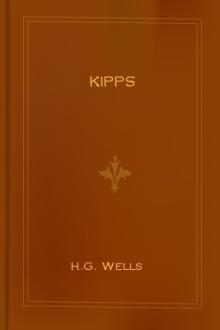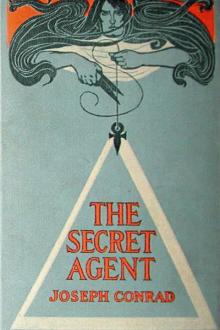The Secret Agent: A Simple Tale, Joseph Conrad [i can read book club .txt] 📗

- Author: Joseph Conrad
Book online «The Secret Agent: A Simple Tale, Joseph Conrad [i can read book club .txt] 📗». Author Joseph Conrad
“May I ask you where you were going?” he inquired in a subdued voice.
“Don’t ask me!” cried Mrs Verloc with a shuddering, repressed violence. All her strong vitality recoiled from the idea of death. “Never mind where I was going. . . .”
Ossipon concluded that she was very much excited but perfectly sober. She remained silent by his side for moment, then all at once she did something which he did not expect. She slipped her hand under his arm. He was startled by the act itself certainly, and quite as much too by the palpably resolute character of this movement. But this being a delicate affair, Comrade Ossipon behaved with delicacy. He contented himself by pressing the hand slightly against his robust ribs. At the same time he felt himself being impelled forward, and yielded to the impulse. At the end of Brett Street he became aware of being directed to the left. He submitted.
The fruiterer at the corner had put out the blazing glory of his oranges and lemons, and Brett Place was all darkness, interspersed with the misty halos of the few lamps defining its triangular shape, with a cluster of three lights on one stand in the middle. The dark forms of the man and woman glided slowly arm in arm along the walls with a loverlike and homeless aspect in the miserable night.
“What would you say if I were to tell you that I was going to find you?” Mrs Verloc asked, gripping his arm with force.
“I would say that you couldn’t find anyone more ready to help you in your trouble,” answered Ossipon, with a notion of making tremendous headway. In fact, the progress of this delicate affair was almost taking his breath away.
“In my trouble!” Mrs Verloc repeated slowly.
“Yes.”
“And do you know what my trouble is?” she whispered with strange intensity.
“Ten minutes after seeing the evening paper,” explained Ossipon with ardour, “I met a fellow whom you may have seen once or twice at the shop perhaps, and I had a talk with him which left no doubt whatever in my mind. Then I started for here, wondering whether you—I’ve been fond of you beyond words ever since I set eyes on your face,” he cried, as if unable to command his feelings.
Comrade Ossipon assumed correctly that no woman was capable of wholly disbelieving such a statement. But he did not know that Mrs Verloc accepted it with all the fierceness the instinct of self-preservation puts into the grip of a drowning person. To the widow of Mr Verloc the robust anarchist was like a radiant messenger of life.
They walked slowly, in step. “I thought so,” Mrs Verloc murmured faintly.
“You’ve read it in my eyes,” suggested Ossipon with great assurance.
“Yes,” she breathed out into his inclined ear.
“A love like mine could not be concealed from a woman like you,” he went on, trying to detach his mind from material considerations such as the business value of the shop, and the amount of money Mr Verloc might have left in the bank. He applied himself to the sentimental side of the affair. In his heart of hearts he was a little shocked at his success. Verloc had been a good fellow, and certainly a very decent husband as far as one could see. However, Comrade Ossipon was not going to quarrel with his luck for the sake of a dead man. Resolutely he suppressed his sympathy for the ghost of Comrade Verloc, and went on.
“I could not conceal it. I was too full of you. I daresay you could not help seeing it in my eyes. But I could not guess it. You were always so distant. . . .”
“What else did you expect?” burst out Mrs Verloc. “I was a respectable woman—”
She paused, then added, as if speaking to herself, in sinister resentment: “Till he made me what I am.”
Ossipon let that pass, and took up his running. “He never did seem to me to be quite worthy of you,” he began, throwing loyalty to the winds. “You were worthy of a better fate.”
Mrs Verloc interrupted bitterly:
“Better fate! He cheated me out of seven years of life.”
“You seemed to live so happily with him.” Ossipon tried to exculpate the lukewarmness of his past conduct. “It’s that what’s made me timid. You seemed to love him. I was surprised—and jealous,” he added.
“Love him!” Mrs Verloc cried out in a whisper, full of scorn and rage. “Love him! I was a good wife to him. I am a respectable woman. You thought I loved him! You did! Look here, Tom—”
The sound of this name thrilled Comrade Ossipon with pride. For his name was Alexander, and he was called Tom by arrangement with the most familiar of his intimates. It was a name of friendship—of moments of expansion. He had no idea that she had ever heard it used by anybody. It was apparent that she had not only caught it, but had treasured it in her memory—perhaps in her heart.
“Look here, Tom! I was a young girl. I was done up. I was tired. I had two people depending on what I could do, and it did seem as if I couldn’t do any more. Two people—mother and the boy. He was much more mine than mother’s. I sat up nights and nights with him on my lap, all alone upstairs, when I wasn’t more than eight years old myself. And then—He was mine, I tell you. . . . You can’t understand that. No man can understand it. What was I to do? There was a young fellow—”
The memory of the early romance with the young butcher survived, tenacious, like the image of a glimpsed ideal in that heart quailing before the fear of the gallows and full of revolt against death.
“That was the man I loved then,” went on the widow of Mr Verloc. “I suppose he could see it in my eyes too. Five and twenty shillings a week, and his father threatened to kick him out of the business if he made such a fool of himself as to marry a girl with a crippled mother and a crazy idiot of a boy on her hands. But he would hang about me, till one evening I found the courage to slam the door in his face. I had to do it. I loved him dearly. Five and twenty shillings a week! There was that other man—a good lodger. What is a girl to do? Could I’ve gone on the streets? He seemed kind. He wanted me, anyhow. What was I to do with mother and that poor boy? Eh? I said yes. He seemed good-natured, he was freehanded, he had money, he never said anything. Seven years—seven years a good wife to him, the kind, the good, the generous, the—And he loved me. Oh yes. He loved me till I sometimes wished myself—Seven years. Seven years a wife to him. And do you know what he was, that dear friend of yours? Do you know what he was? He was a devil!”
The superhuman vehemence of that whispered statement completely stunned Comrade Ossipon. Winnie Verloc turning about held him by both arms, facing him under the falling mist in the darkness and solitude of Brett Place, in which all sounds of life seemed lost as if in a triangular well of asphalt and bricks, of blind houses and unfeeling stones.
“No; I didn’t know,” he declared, with a sort of flabby stupidity, whose comical aspect was lost upon a woman haunted by the fear of the gallows, “but I do now. I—I understand,” he floundered on, his mind speculating as to what sort of atrocities Verloc could have practised under the sleepy, placid appearances of his married estate. It was positively awful. “I understand,” he repeated, and then by a sudden inspiration uttered an—“Unhappy woman!” of lofty commiseration instead of the more familiar “Poor darling!” of his usual practice. This was no usual case. He felt conscious of something abnormal going on, while he never lost sight of the greatness of the stake. “Unhappy, brave woman!”
He was glad to have discovered that variation; but he could discover nothing else.
“Ah, but he is dead now,” was the best he could do. And he put a remarkable amount of animosity into his guarded exclamation. Mrs Verloc caught at his arm with a sort of frenzy.
“You guessed then he was dead,” she murmured, as if beside herself. “You! You guessed what I had to do. Had to!”
There were suggestions of triumph, relief, gratitude in the indefinable tone of these words. It engrossed the whole attention of Ossipon to the detriment of mere literal sense. He wondered what was up with her, why she had worked herself into this state of wild excitement. He even began to wonder whether the hidden causes of that Greenwich Park affair did not lie deep in the unhappy circumstances of the Verlocs’ married life. He went so far as to suspect Mr Verloc of having selected that extraordinary manner of committing suicide. By Jove! that would account for the utter inanity and wrong-headedness of the thing. No anarchist manifestation was required by the circumstances. Quite the contrary; and Verloc was as well aware of that as any other revolutionist of his standing. What an immense joke if Verloc had simply made fools of the whole of Europe, of the revolutionary world, of the police, of the press, and of the cocksure Professor as well. Indeed, thought Ossipon, in astonishment, it seemed almost certain that he did! Poor beggar! It struck him as very possible that of that household of two it wasn’t precisely the man who was the devil.
Alexander Ossipon, nicknamed the Doctor, was naturally inclined to think indulgently of his men friends. He eyed Mrs Verloc hanging on his arm. Of his women friends he thought in a specially practical way. Why Mrs Verloc should exclaim at his knowledge of Mr Verloc’s death, which was no guess at all, did not disturb him beyond measure. They often talked like lunatics. But he was curious to know how she had been informed. The papers could tell her nothing beyond the mere fact: the man blown to pieces in Greenwich Park not having been identified. It was inconceivable on any theory that Verloc should have given her an inkling of his intention—whatever it was. This problem interested Comrade Ossipon immensely. He stopped short. They had gone then along the three sides of Brett Place, and were near the end of Brett Street again.
“How did you first come to hear of it?” he asked in a tone he tried to render appropriate to the character of the revelations which had been made to him by the woman at his side.
She shook violently for a while before she answered in a listless voice.
“From the police. A chief inspector came, Chief Inspector Heat he said he was. He showed me—”
Mrs Verloc choked. “Oh, Tom, they had to gather him up with a shovel.”
Her breast heaved with dry sobs. In a moment Ossipon found his tongue.
“The police! Do you mean to say the police came already? That Chief Inspector Heat himself actually came to tell you.”
“Yes,” she confirmed in the same listless tone. “He came just like this. He came. I didn’t know. He showed me a piece of overcoat, and—just like that. Do you know this? he says.”
“Heat! Heat! And what did he do?”
Mrs Verloc’s head dropped. “Nothing. He did nothing. He went away. The police were on that man’s side,” she murmured tragically. “Another one came too.”
“Another—another inspector, do you mean?” asked Ossipon, in great excitement, and very much in the tone of a scared child.
“I don’t know. He came. He looked like a foreigner. He may have been one of them Embassy people.”
Comrade Ossipon nearly collapsed under this new shock.
“Embassy! Are you aware what you are saying? What Embassy? What on earth do you mean by Embassy?”
“It’s that place in Chesham Square. The people he cursed so. I don’t know. What does it matter!”
“And that fellow, what did he do or say to you?”
“I don’t remember. . . . Nothing . . . . I don’t care. Don’t ask me,” she pleaded in a weary voice.
“All right. I won’t,” assented Ossipon tenderly. And he meant it too, not because he was touched by the pathos of the pleading voice, but because he felt himself losing his footing in the depths of this tenebrous affair. Police! Embassy! Phew! For fear of adventuring his intelligence into ways where its natural lights might fail to guide it safely he dismissed resolutely all suppositions, surmises, and theories out of his mind. He had the woman there, absolutely flinging herself at him, and that was the principal consideration. But after what he had heard nothing could astonish him any more. And when Mrs Verloc, as if startled suddenly out of a dream of safety, began





Comments (0)